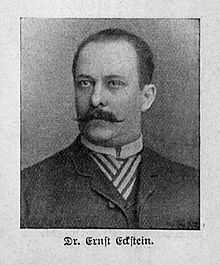Ernst Eckstein
From Wikipedia, the free encyclopedia

Ernst Eckstein.
Ernst Eckstein (6 February 1845, Giessen, Grand Duchy of Hesse –18 November 1900) was a German humorist, novelist and poet.
Biography
From the university he went to Paris, and there completed his comic epos, Check to the Queen (1870), and wrote Paris Silhouettes (1873), the grotesque night-piece The Varzin Ghosts and the Mute of Seville. Later he wrote the stories Margherita, At the Tomb of Cestius, The Mosque at Cordova. He was editor of a literary and critical journal, Hall of Poets, and of a humorous weekly, The Wag, at Leipzig, for some years, and in 1885 settled in Dresden. He also wrote The Claudii, Aphrodite, a Story of Ancient Hellas, Decius the Flute-player: a Merry Story of a Musician in Ancient Rome.
Works
- Venus Urania, 1872
- Humoresken, 1875/82
- Beiträge zur Geschichte des Feuilletons, 1876
- Lisa Toscanella (Novellae), 1876
- Pariser Leben, 1876
- Ein Pessimist (Comedy), 1877
- Sturmnacht (Novellae), 1878
- Die Claudier (Novel), 1881
- Prusias. Roman aus dem letzten Jahrhundert der römischen Republik, 1884
- Jorinde (Novel), 1888
- Nero (Novel), 1889
- Das Kind (Novellae), 1893
- Verstehen wir Deutsch? Volkstümliche Sprachuntersuchungen, 1894
- Familie Hartwig (Novel), 1894
- Roderich Löhr (Novel), 1896
- Willibald Menz. Lavafluten (Novel), 1898
- Die Klosterschülerin (Novel), 1899
- Die Märchenprinzessin (Novel), 1901
- Gesammelte Schulhumoresken, 1907
References
 "Eckstein, Ernst". Collier's New Encyclopedia. 1921.
"Eckstein, Ernst". Collier's New Encyclopedia. 1921.
| Wikimedia Commons has media related to Ernst Eckstein. |
|
This article is issued from Wikipedia. The text is available under the Creative Commons Attribution/Share Alike; additional terms may apply for the media files.